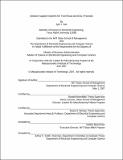Decision support systems for tool reuse and EOL processes
Author(s)
Gan, Jyeh J
DownloadFull printable version (934.1Kb)
Other Contributors
Leaders for Manufacturing Program.
Advisor
Donald Rosenfield and Duane S. Boning.
Terms of use
Metadata
Show full item recordAbstract
Intel® is a manufacturing company that concentrates on the fabrication process of computer chips. Over the years and into the future, Intel® has gone through multiple and advanced generations of manufacturing technology caused by new fabrication techniques and increased wafer sizes. These advances have resulted in significant opportunities for cost reduction which includes reuse of semiconductor equipment within Intel factories and sale of used semiconductor equipment. To ensure assets are transferred in a safe and timely manner, Intel developed a 6D program (Decontamination, Decommission, Demolition, Demolition-System, Delivery, and Deployment) to standardize the EOL (End of Life) process of transferring a tool from the factory to its final destination in reuse, sale, parts harvesting, donation or scrap. Like other multi-national companies, Intel® has decentralized manufacturing processes over multiple worldwide sites; most if not all the fabrication, sort, and assembly tool information is archived in multiple repositories/systems. In addition to the scattering of knowledge, the tool-related information appears not to be comprehensive, including data fields not matching across multiple systems. (cont.) As a result, significant time is consumed to ensure the comprehensiveness and the accuracy of the required data across the multiple sites. Thus a comprehensive map of information infrastructure based on the 6D process is necessary to understand and enhance efficiencies in the knowledge flow process. Detailed mapping of databases and their meta-data will help identify the thoroughness, accuracy, redundancy, and inefficiency in the tool-related information systems as they relate to 6D. A prototype of a "one-stop-site"was developed and key Knowledge Management recommendations were proposed to enhance efficiency by further reducing costs, time, and resources.
Description
Thesis (M.B.A.)--Massachusetts Institute of Technology, Sloan School of Management; and, (S.M.)--Massachusetts Institute of Technology, Dept. of Electrical Engineering and Computer Science; in conjunction with the Leaders for Manufacturing Program at MIT, 2007. This electronic version was submitted by the student author. The certified thesis is available in the Institute Archives and Special Collections. Includes bibliographical references (p. 68-69).
Date issued
2007Department
Leaders for Manufacturing Program at MIT; Massachusetts Institute of Technology. Department of Electrical Engineering and Computer Science; Sloan School of ManagementPublisher
Massachusetts Institute of Technology
Keywords
Sloan School of Management., Electrical Engineering and Computer Science., Leaders for Manufacturing Program.